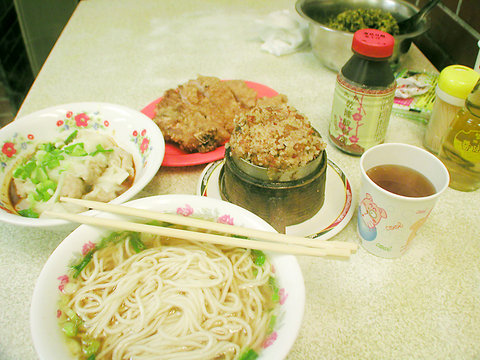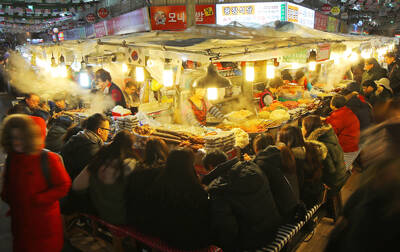When the mercury dips to the lows we've seen in the past few weeks, maybe the best ways to beat back the blues and warm up the soul is to tuck into a massive bowl of beef-noodle soup.
There's any number of beef-noodle joints around town to satisfy a quick hankering for beef-noodle soup, but only a few have made this northern Chinese specialty an art form. One of these is Yong-Kang Beef Noodle off Yongkang Street.
Now into its third generation, this noodle shop is almost as much of a neighborhood landmark as Ting-Tai-Feng (

PHOTO: MAX WOODWORTH, TAIPEI TIMES
As might be expected, Yong-Kang Beef Noodle is famed for its namesake, which it serves in an extra-spicy, scallion filled stock with fatty chunks of beef that are several mouthfuls each. The meat is perfectly tender and could practically serve as a meal on its own. But the noodles are also wonderfully tasty, as they're cooked to that perfect texture that makes them not too soft and not too chewy.
This seems like a simple point, but the number of noodle joints that skimp on their noodle selection, or simply don't cook them right makes it worth mentioning.
Yong-Kang Beef Noodle fills out its menu with other noodle staples, such as cow-tendon noodles and pork-chop noodles. The former is served in the store's beloved beef broth, while the pork offering comes in a clear but hearty pork stock that, relative to the more popular beef soup, is a tad light.
For this review, my two companions and I also ordered the chao-shou (
More on the mark was the pork rib steamed in rice on a bed of sweet potato. Served in a tiny steamer, the spices blended into the rice complement the meat beautifully, while the sweet potato brings balance to the flavors with its mild hint of sweetness.
After all the spices and heavy flavors, to restore calm to buzzing taste buds try the Qianlong (

In recent weeks the Trump Administration has been demanding that Taiwan transfer half of its chip manufacturing to the US. In an interview with NewsNation, US Secretary of Commerce Howard Lutnick said that the US would need 50 percent of domestic chip production to protect Taiwan. He stated, discussing Taiwan’s chip production: “My argument to them was, well, if you have 95 percent, how am I gonna get it to protect you? You’re going to put it on a plane? You’re going to put it on a boat?” The stench of the Trump Administration’s mafia-style notions of “protection” was strong

Late last month US authorities used allegations of forced labor at bicycle manufacturer Giant Group (巨大集團) to block imports from the firm. CNN reported: “Giant, the world’s largest bike manufacturer, on Thursday warned of delays to shipments to the United States after American customs officials announced a surprise ban on imports over unspecified forced labor accusations.” The order to stop shipments, from the US Customs and Border Protection (CBP), came as a surprise to Giant, company officials said. Giant spokesman Ken Li (李書耕) said that the CPB never visited the company’s factories to conduct on-site investigations, nor to interview or

Every now and then, it’s nice to just point somewhere on a map and head out with no plan. In Taiwan, where convenience reigns, food options are plentiful and people are generally friendly and helpful, this type of trip is that much easier to pull off. One day last November, a spur-of-the-moment day hike in the hills of Chiayi County turned into a surprisingly memorable experience that impressed on me once again how fortunate we all are to call this island home. The scenery I walked through that day — a mix of forest and farms reaching up into the clouds

“Eighteen years ago, people didn’t even know the name of this ingredient,” says 58-year-old Gil Sa-hyeon, holding up a cluster of dried brownish stems. “Now it’s everywhere.” His shop, Joseon Yakcho, sits in the heart of Seoul’s Yangnyeongsi Market, South Korea’s largest traditional medicinal herb market, its streets lined with shops displaying buckets of herbs such as licorice root and cinnamon bark that spill on to the pavements, filling the air with their distinct, earthy aroma. The ingredient Gil is referring to is hovenia dulcis, known in Korean as heotgae — the oriental raisin tree that’s become the cornerstone of South Korea’s